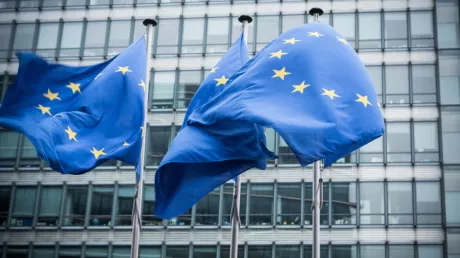
Digital signatures – legally binding and mobile
published on 10.03.2018
Since 2016, the EU’s eIDAS Regulation has provided a uniform legal framework for electronic proof of identity throughout Europe. Companies and public authorities can now easily integrate digital signatures into their business processes and use new innovative methods for mutual identification.
Qualified electronic signatures according to the eIDAS standard
Although the name may be quite a mouthful, eIDAS does in fact make life in the business world easier. Take, for example, a bid invitation: A German company wants to take part in a tender within Europe. Up to now, the company had to print out, sign and send the documents in multiple copies – and hope that they reach the recipient by post before the deadline. This procedure cost both sides a lot of time and money.
With electronic signatures, this step can be digitized without sacrificing security. Qualified electronic signatures (QES) have the same legal validity as hand-written signatures – now also across European borders.
Overcoming borders
eIDAS is an EU regulation and thus directly applicable law in all 28 EU Member States as well as in the European Economic Area. The regulation creates cross-border standards and guarantees the interoperability of applications.
Regulations in individual countries still exist but may not contradict eIDAS. The aim of the regulation is to enable private individuals and businesses to use electronic means of identification (eIDs) for online services in other EU countries. The aim is also to break down barriers to so-called trust services, which issue, verify and validate signatures and cards against payment. Trust service providers, such as Bundesdruckerei's subsidiary D Trust, which meet all eIDAS requirements, are regarded as qualified trust service providers.
Qualified electronic signatures (QES), which in addition to encryption are protected with two factor authentication using the personal certificates of a trust service provider, fulfil the highest legal obligation. They allow the recipient to verify that a document has not been altered after being sent by the sender, the recipient can also unambiguously verify the identity of the person at the other end.
Online and mobile signing
Bundesdruckerei is currently working on integrating the new eIDAS-based mobile signature into its sign me web platform. In the future, loan applications and purchase agreements can be created on the computer and signed with sign me using qualified remote signatures.
As a qualified trust service provider, D Trust issues the required certificates for sign-me. Since these no longer have to be stored on a signature card, but are securely managed at D Trust, users no longer need a reader.
This makes it even easier to conclude contracts quickly and without changing media. As a next step, legal entities can use the application securely and easily for electronic proof of origin, to digitally seal documents and conveniently trace all processes that require a signature while on the move.
The use of sign me is particularly interesting for industries that require signatures, such as public administration, banks, insurance companies, but also companies from the healthcare sector and associations. They can integrate sign me into their systems and design the interface with their own corporate design. No special software is required for this.




